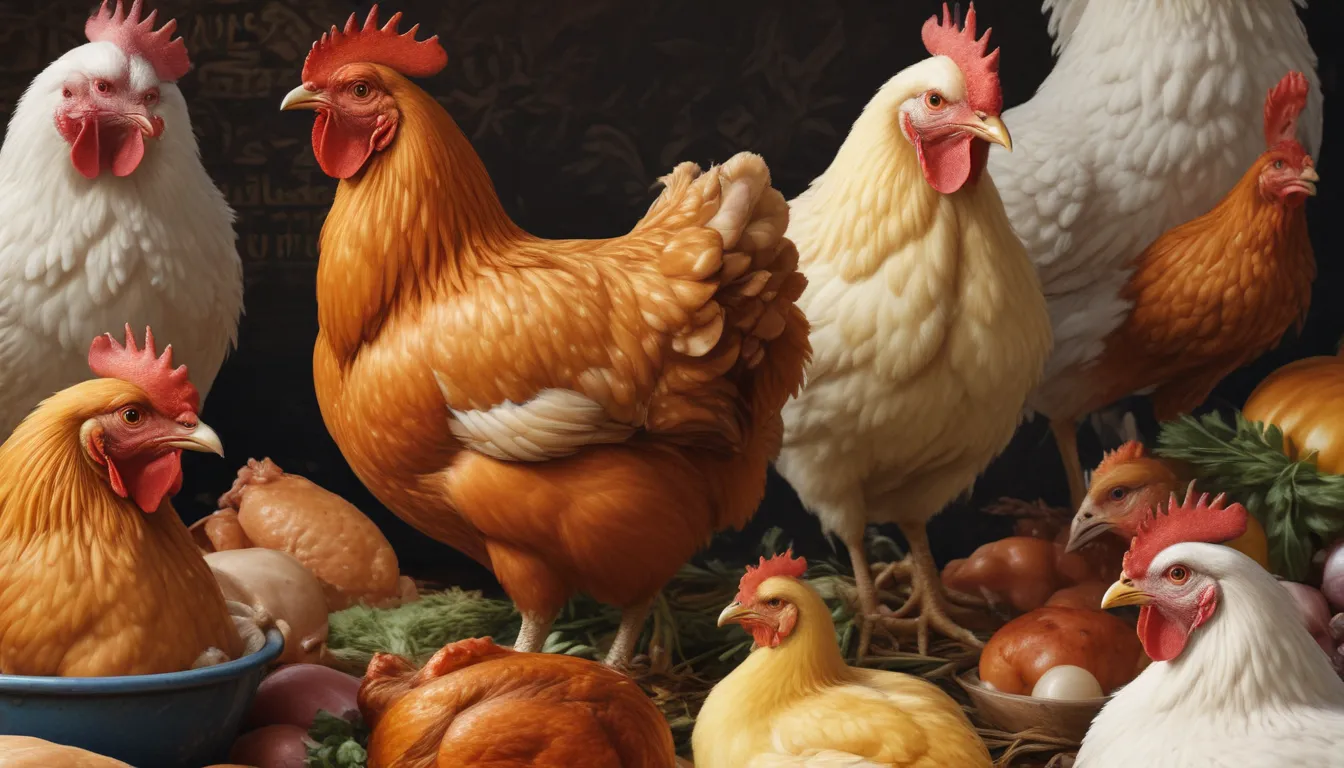The pictures in our articles might not always show exactly what the text is talking about. We use these images to make the article more interesting and eye-catching. They are there to add to the text, but not to replace it or show every detail.
Chicken, the beloved poultry, is a versatile and cherished meat consumed globally in various delightful forms. From grilled to stewed, chicken dishes have secured a special place in the hearts of many. Not only does chicken offer a rich source of protein, but it also boasts a myriad of nutritional benefits that have made it a staple in diets for centuries.
Unveiling the Fascinating World of Chicken
Let's embark on a journey to uncover 13 captivating facts about chicken that may surprise you. From its ancient origins to its profound impact on the culinary landscape, these facts shed light on the significance of chicken as an essential dietary component. Get ready to explore the enchanting realm of these feathered creatures and develop a newfound appreciation for the wonders of chicken.
The Phenomenon of Chickens
- Chickens are more than a mere source of food; they exhibit diverse diets, impressive memories, and even possess the ability to recognize themselves in mirrors. These fascinating creatures boast unique personalities and intricate social structures, making them a marvel to behold.
The Splendor of Chicken Facts
-
Chickens: The Most Common Bird Species
- Surprisingly, chickens reign as the most common bird species on the planet, outnumbering all other avian counterparts. With billions of chickens roaming the earth, they have become an integral part of many cultural diets globally.
-
A Legacy of Domestication
- Chickens have a rich history of domestication that spans over 5,000 years, originating in Asia and spreading across the world. Their presence has permeated nearly every corner of the globe, leaving an indelible mark on human civilization.
-
The Tapestry of Chicken Breeds
- Boasting over 500 diverse breeds, chickens come in a multitude of varieties ranging from the popular Rhode Island Red to the exotic Silkie. Each breed possesses distinct characteristics, including feather colors, sizes, and unique personalities.
-
Guardians of Pest Control
- Beyond their role as egg and meat suppliers, chickens serve as excellent pest control agents. Their appetite for insects, ticks, and rodents makes them valuable allies in maintaining pest-free environments on farms and gardens.
-
The Language of Chicken
- Listen closely near a chicken coop, and you'll be greeted by an array of vocalizations as chickens communicate through clucking, crowing, and purring. They even have specific warning calls to alert others of potential dangers.
-
A Memory to Marvel
- Contrary to popular belief, chickens possess remarkable memories, capable of recognizing up to 100 different faces including those of humans. They react uniquely to each individual, showcasing their cognitive prowess.
-
The Pecking Order
- In their complex social hierarchy, chickens establish a pecking order to determine dominance within the flock. This system contributes to maintaining harmony and structure among the group.
-
A Varied Culinary Palette
- While commonly associated with grains, chickens enjoy a diverse diet encompassing insects, seeds, fruits, and even small reptiles or amphibians. Their foraging habits highlight their omnivorous nature.
-
Mirror, Mirror on the Wall
- Recent studies have unveiled that chickens exhibit self-awareness, being able to recognize themselves in mirrors. This unique trait is shared by select species like primates and dolphins.
-
Feathered Diversity
- With various feather types serving distinct functions, chickens are equipped with outer feathers for insulation and water repellence while relying on down feathers to stay warm during colder climates.
-
Taking Flight
- Despite their reputation as non-fliers, chickens can soar short distances when needed. Their wings provide an escape mechanism from predators or aid them in reaching roosting spots.
-
Individual Personalities
- Every chicken possesses a distinct personality, ranging from friendly and outgoing to shy or assertive. Observing their behaviors and interactions provides insights into their unique identities.
-
Social Creatures
- Thriving on social interaction, chickens revel in companionship as they groom each other, indulge in dust baths, and share meals. Creating a social environment is essential for their well-being and contentment.
The Culinary Delight of Chicken
In conclusion, chicken stands as a versatile and nutritious protein source that offers a plethora of health benefits. Abundant in essential nutrients and low in fat, chicken can be prepared in a myriad of delectable ways to suit various taste preferences. Whether grilled, roasted, or incorporated into flavorful dishes, chicken transcends cultural boundaries to become a beloved culinary favorite worldwide. Remember these 13 fascinating facts about chicken as you savor its delectable flavors and appreciate the remarkable journey from farm to table.
Frequently Asked Questions About Chicken
-
Is chicken a healthy protein choice?
- Yes, chicken is a healthy protein choice as it is low in fat and rich in essential nutrients like protein, vitamins, and minerals.
-
What is the nutritional value of chicken?
- Chicken provides a good source of protein along with essential vitamins B6 and B12, niacin, selenium, and phosphorus.
-
Can chicken be cooked in different ways?
- Absolutely! Chicken can be grilled, roasted, baked, fried, or slow-cooked, offering a myriad of culinary possibilities in terms of textures and flavors.
-
How should chicken be stored?
- Raw chicken should be refrigerated at or below 40°F (4°C) to prevent bacterial growth. Cooked chicken should be stored in an airtight container and consumed within a few days.
-
Can chicken be part of a balanced diet?
- Yes, chicken can be a vital component of a balanced diet due to its lean protein content. Pairing chicken with healthy vegetables and grains creates a well-rounded meal.
-
Are there cultural significances or traditions associated with chicken?
- Yes, chicken holds cultural significance in various traditions, often featured in celebratory dishes and symbolizing good luck or prosperity in some cultures.
-
Is it safe to eat the skin of chicken?
- Moderation is key when consuming chicken skin as it contains higher amounts of fat and calories compared to the lean meat.
-
What is the ideal internal temperature for cooked chicken?
- Cooked chicken should reach an internal temperature of 165°F (74°C) to ensure it is safe to eat and free from harmful bacteria.
-
Can chicken aid in weight loss efforts?
- Absolutely! Chicken is a great option for weight loss as it is low in calories and high in protein, promoting a feeling of fullness and satisfaction.
-
What precautions should be taken when handling raw chicken?
- When handling raw chicken, prevent cross-contamination by washing hands, utensils, and surfaces that come into contact with raw chicken. Ensure thorough cooking to eliminate any bacteria present.
Embracing the Beauty of Chicken
As we delve into the enchanting world of chickens, we discover a wealth of fascinating facts that illuminate their exceptional nature. From their ancient beginnings to their diverse diets and unique personalities, chickens hold a special place in both our hearts and our culinary traditions. Let these intriguing insights enhance your appreciation for the cherished poultry that graces our tables and enriches our lives with nourishment and delight.






